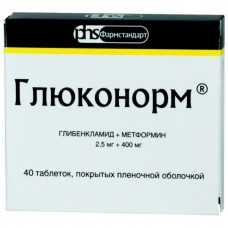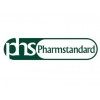Expiration date: 04/2026
Pharm group: hypoglycemic agent for oral administration (second generation sulfonylurea+biguanide).
Formdata: combined Oral hypoglycemic agent, derived sulfonylureas II generation.
Has pancreatic and extrapancreatic effects.
Glibenclamide stimulates insulin secretion by reducing the threshold of stimulation by glucose beta cells of pancreas, improves insulin sensitivity and the degree of its binding to target cells, increases insulin release, enhances the effect of insulin on glucose uptake by muscle and liver, inhibits lipolysis in adipose tissue. Operates in the second phase of insulin secretion.
Metformin inhibits hepatic gluconeogenesis, decreases absorption of glucose from the digestive tract and promotes its utilization in the tissues, decreases the contents of TG and cholesterol in serum. Increases insulin binding to receptors (in the absence of blood insulin therapeutic effect is not evident). It does not cause hypoglycemic reactions.
Hypoglycemic effect develops in 2 hours and lasts for 12 h
Pharmacokinetics: Glibenclamide quickly and adequately (84%) absorbed in the digestive tract, TCmax - 7-8 hours Connection with the plasma protein - 97%.
Almost completely metabolized in the liver to inactive metabolites. 50% is excreted by kidneys, 50% - with bile. T1/2 - 10-16 h
Metformin after absorption in the gastrointestinal tract (absorption - 48-52%) is excreted by the kidneys (mostly unchanged), partly by the intestines. T1/2 is 9-12 h.
Indications: diabetes mellitus type 2 (with the ineffectiveness of diet alone or oral hypoglycemic drugs).
Contraindications:
- hypersensitivity, diabetes mellitus type 1, diabetic ketoacidosis, diabetic precoma and coma, lactate-acidosis (including history),
- renal failure (creatinine more than 135 mmol/l in men and more than 110 mmol/l in women), acute conditions that may lead to kidney dysfunction (dehydration, severe infection, shock, intravascular administration of iodinated contrast agents),
- acute and chronic diseases accompanied by tissue hypoxia (including heart failure, respiratory failure, recent myocardial infart, shock), hepatic insufficiency, acute alcohol intoxication, porphyria, concomitant use of miconazole,
- pregnancy, lactation.
With caution. Alcoholism, adrenal insufficiency, gipofunktia anterior pituitary, thyroid disease violation of its functions.
Dosing: Inside, while eating. The dosage regimen is selected individually, depending on the condition of metabolism.
The usual starting dose is 1 tablet (2.5 mg of glibenclamide and 500 mg Metformin), with a gradual selection of the dose every 1-2 weeks depending on the glycemic index.
When replacing the previous combination therapy with Metformin and glibenclamide (as separate components) appoint 1-2 tablets (2.5 mg of glibenclamide and 500 mg Metformin) depending on the previous dose of each component.
The maximum daily dose - 4 tablets (2.5 or 5 mg of glibenclamide and 500 mg Metformin).
Side effects: Metformin: nausea, vomiting, abdominal pain, loss of appetite, metallic taste in the mouth, erythema (as a manifestation of hypersensitivity), reduced absorption and, as a consequence, concentration of cyanocobalamin in plasma (with prolonged use), lactate-acidosis.
Glibenclamide: hypoglycemia, makulopapuleznaya rash (including mucous membranes), skin itching, urticaria, photosensitivity, nausea, vomiting, discomfort in the epigastric region, increased activity "liver" transaminases, hepatitis, leukopenia, thrombocytopenia, agranulocytosis, haemolytic anaemia, bone marrow aplasia, pancytopenia, and cutaneous hepatic porphyria, hyponatremia, gipercreatininemia, increase of urea in the blood plasma, disulfiramopodobna reaction (with simultaneous use with ethanol).
Overdose: Symptoms: hypoglycemia and lactate-acidosis.
Treatment: hypoglycemia (if patient conscious) into sugar, loss of consciousness/dextrose or 1-2 ml of glucagon. After recovering consciousness should give the patient foods rich in easily digestible carbohydrates (to avoid a recurrence of hypoglycemia).
Interaction: Miconazole - risk of hypoglycaemia (until Tuesday).
Fluconazole - risk of hypoglycemia (increases T1/2 of sulfonylureas).
Phenylbutazone may displace sulfonylureas (glibenclamide) from the blood, which can lead to the increase of their concentration in plasma and the risk of hypoglycemia.
The use of iodinated radiopaque drugs (intravascular injection) may lead to the development of the human kidney, and Metformin accumulation, increasing the risk of the development of lactate-acidosis. Drug treatment abolished for 48 h before their introduction and resume no earlier than 48 hours.
Application etanolsodergaszczye funds against the background of glibenclamide may lead to the development of disulfiramopodobna reactions.
Corticosteroids, beta2-agonists, diuretics can lead to reduced effectiveness of the drug may require dose adjustment of the drug.
Ingibitory APF - risk of hypoglycemia on the background of the use of sulfonylureas (glibenclamide).
Beta-blockers increase the frequency and severity of hypoglycemia.
Antibacterial drugs from the group of sulfonamides, fluoroquinolones, anticoagulants (coumarin derivatives), MAO inhibitors, chloramphenicol, pentoxifylline, lipid-lowering drugs from the group of fibrates, disopyramide - the risk of hypoglycemia on the background of the application of glibenclamide.
Special instructions: major surgery and trauma, extensive burns, infectious diseases febrile syndrome may require the cancellation of oral hypoglycemic drugs and insulin purpose.
Should regularly monitor the concentration of glucose in the blood prandial and after meals, the daily curve of glucose in the blood.
It should warn patients about the increased risk of hypoglycemia in cases of ingestion of ethanol, NSAIDs when fasting.
A correction dose with physical and emotional stress, change in diet.
With care appoint on a background therapy of beta-blockers.
When symptoms of hypoglycemia use carbohydrates (sugar), in severe cases - in/in slowly injected dextrose solution.
You must stop the drug for 2 d before any angiographic or urograficskih studies (therapy is resumed 48 hours after the examination).
Against the use of etanolsodergaszczye substances may develop disulfiramopodobna reactions.
During the period of treatment must be careful when driving and occupation of other potentially hazardous activities, require high concentration and psychomotor speed reactions.


